Location
Location ANSS
The ANSS event ID is ak013azm6wlj and the event page is at
https://earthquake.usgs.gov/earthquakes/eventpage/ak013azm6wlj/executive.
2013/08/27 21:41:33 63.205 -150.604 129.5 5 Alaska
Focal Mechanism
USGS/SLU Moment Tensor Solution
ENS 2013/08/27 21:41:33:0 63.21 -150.60 129.5 5.0 Alaska
Stations used:
AK.COLD AK.DOT AK.PAX AK.PPLA AK.SWD AT.MENT AT.PMR AT.SVW2
AT.TTA
Filtering commands used:
cut a -30 a 120
rtr
taper w 0.1
hp c 0.02 n 3
lp c 0.05 n 3
Best Fitting Double Couple
Mo = 2.37e+23 dyne-cm
Mw = 4.85
Z = 137 km
Plane Strike Dip Rake
NP1 16 87 110
NP2 115 20 10
Principal Axes:
Axis Value Plunge Azimuth
T 2.37e+23 45 305
N 0.00e+00 20 194
P -2.37e+23 38 88
Moment Tensor: (dyne-cm)
Component Value
Mxx 3.94e+22
Mxy -6.15e+22
Mxz 6.42e+22
Myy -6.59e+22
Myz -2.12e+23
Mzz 2.65e+22
############--
################------
###################---------
###################-----------
#####################-------------
######################--------------
######## ###########----------------
-######## T ###########-----------------
-######## ##########------------------
--#####################--------- -------
--####################---------- P -------
--####################---------- -------
---##################---------------------
--##################--------------------
---################---------------------
---##############---------------------
----############--------------------
-----#########-------------------#
-----#######-----------------#
--------##--------------####
------################
--############
Global CMT Convention Moment Tensor:
R T P
2.65e+22 6.42e+22 2.12e+23
6.42e+22 3.94e+22 6.15e+22
2.12e+23 6.15e+22 -6.59e+22
Details of the solution is found at
http://www.eas.slu.edu/eqc/eqc_mt/MECH.NA/20130827214133/index.html
|
Preferred Solution
The preferred solution from an analysis of the surface-wave spectral amplitude radiation pattern, waveform inversion or first motion observations is
STK = 115
DIP = 20
RAKE = 10
MW = 4.85
HS = 137.0
The NDK file is 20130827214133.ndk
The waveform inversion is preferred.
Moment Tensor Comparison
The following compares this source inversion to those provided by others. The purpose is to look for major differences and also to note slight differences that might be inherent to the processing procedure. For completeness the USGS/SLU solution is repeated from above.
| SLU |
USGSMT |
USGS/SLU Moment Tensor Solution
ENS 2013/08/27 21:41:33:0 63.21 -150.60 129.5 5.0 Alaska
Stations used:
AK.COLD AK.DOT AK.PAX AK.PPLA AK.SWD AT.MENT AT.PMR AT.SVW2
AT.TTA
Filtering commands used:
cut a -30 a 120
rtr
taper w 0.1
hp c 0.02 n 3
lp c 0.05 n 3
Best Fitting Double Couple
Mo = 2.37e+23 dyne-cm
Mw = 4.85
Z = 137 km
Plane Strike Dip Rake
NP1 16 87 110
NP2 115 20 10
Principal Axes:
Axis Value Plunge Azimuth
T 2.37e+23 45 305
N 0.00e+00 20 194
P -2.37e+23 38 88
Moment Tensor: (dyne-cm)
Component Value
Mxx 3.94e+22
Mxy -6.15e+22
Mxz 6.42e+22
Myy -6.59e+22
Myz -2.12e+23
Mzz 2.65e+22
############--
################------
###################---------
###################-----------
#####################-------------
######################--------------
######## ###########----------------
-######## T ###########-----------------
-######## ##########------------------
--#####################--------- -------
--####################---------- P -------
--####################---------- -------
---##################---------------------
--##################--------------------
---################---------------------
---##############---------------------
----############--------------------
-----#########-------------------#
-----#######-----------------#
--------##--------------####
------################
--############
Global CMT Convention Moment Tensor:
R T P
2.65e+22 6.42e+22 2.12e+23
6.42e+22 3.94e+22 6.15e+22
2.12e+23 6.15e+22 -6.59e+22
Details of the solution is found at
http://www.eas.slu.edu/eqc/eqc_mt/MECH.NA/20130827214133/index.html
|
us usb000jce7_Mww
Type Mww
Moment 2.48e+16 N-m
Magnitude 4.9
Percent DC 86%
Depth 130.0 km
Author us
Updated 2013-08-27 23:05:45 UTC
Principal Axes
Axis Value Plunge Azimuth
T 2.397 37° 269°
N 0.159 16° 11°
P -2.556 48° 120°
Nodal Planes
Plane Strike Dip Rake
NP1 193° 84° -74°
NP2 302° 17° -160°
 in the context of other nearby events (blue) in the SLU Moment Tensor Catalog. The right panel shows the inferred direction of maximum compressive stress and the type of faulting (green is strike-slip, red is normal, blue is thrust; oblique is shown by a combination of colors). Thus context plot is useful for assessing the appropriateness of the moment tensor of this event.
<br>
<table>
<tr><td><img src=) |
Waveform Inversion using wvfgrd96
The focal mechanism was determined using broadband seismic waveforms. The location of the event (star) and the
stations used for (red) the waveform inversion are shown in the next figure.
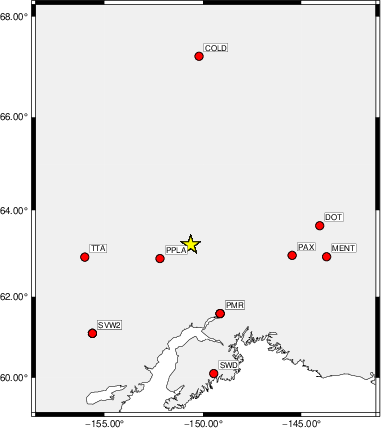
|
|
Location of broadband stations used for waveform inversion
|
The program wvfgrd96 was used with good traces observed at short distance to determine the focal mechanism, depth and seismic moment. This technique requires a high quality signal and well determined velocity model for the Green's functions. To the extent that these are the quality data, this type of mechanism should be preferred over the radiation pattern technique which requires the separate step of defining the pressure and tension quadrants and the correct strike.
The observed and predicted traces are filtered using the following gsac commands:
cut a -30 a 120
rtr
taper w 0.1
hp c 0.02 n 3
lp c 0.05 n 3
The results of this grid search are as follow:
DEPTH STK DIP RAKE MW FIT
WVFGRD96 0.5 320 50 -70 3.84 0.1840
WVFGRD96 1.0 130 40 -85 3.88 0.1996
WVFGRD96 2.0 130 40 -85 3.97 0.2398
WVFGRD96 3.0 140 40 -75 4.04 0.2653
WVFGRD96 4.0 145 40 -70 4.08 0.2591
WVFGRD96 5.0 10 80 15 4.11 0.2632
WVFGRD96 6.0 10 80 10 4.15 0.2783
WVFGRD96 7.0 10 80 10 4.18 0.2958
WVFGRD96 8.0 10 80 10 4.22 0.3067
WVFGRD96 9.0 15 75 10 4.25 0.3191
WVFGRD96 10.0 15 75 10 4.28 0.3275
WVFGRD96 11.0 10 80 10 4.29 0.3296
WVFGRD96 12.0 10 80 10 4.30 0.3283
WVFGRD96 13.0 10 80 10 4.31 0.3249
WVFGRD96 14.0 10 80 10 4.32 0.3226
WVFGRD96 15.0 10 80 10 4.32 0.3243
WVFGRD96 16.0 10 80 15 4.31 0.3250
WVFGRD96 17.0 10 80 15 4.31 0.3255
WVFGRD96 18.0 10 80 15 4.32 0.3256
WVFGRD96 19.0 10 80 15 4.32 0.3257
WVFGRD96 20.0 10 80 15 4.33 0.3269
WVFGRD96 21.0 10 85 15 4.35 0.3264
WVFGRD96 22.0 10 85 15 4.35 0.3276
WVFGRD96 23.0 10 85 15 4.35 0.3295
WVFGRD96 24.0 10 85 15 4.36 0.3282
WVFGRD96 25.0 10 85 15 4.36 0.3292
WVFGRD96 26.0 10 85 20 4.34 0.3292
WVFGRD96 27.0 10 85 20 4.35 0.3312
WVFGRD96 28.0 185 90 -20 4.36 0.3314
WVFGRD96 29.0 185 90 -20 4.36 0.3320
WVFGRD96 30.0 5 90 20 4.37 0.3343
WVFGRD96 31.0 5 90 20 4.37 0.3352
WVFGRD96 32.0 5 90 20 4.38 0.3343
WVFGRD96 33.0 185 90 -20 4.39 0.3344
WVFGRD96 34.0 5 90 20 4.39 0.3353
WVFGRD96 35.0 190 90 -20 4.40 0.3341
WVFGRD96 36.0 10 90 15 4.44 0.3335
WVFGRD96 37.0 190 90 -15 4.45 0.3321
WVFGRD96 38.0 190 90 -15 4.46 0.3329
WVFGRD96 39.0 10 85 10 4.49 0.3345
WVFGRD96 40.0 280 85 -10 4.55 0.3407
WVFGRD96 41.0 280 85 -10 4.56 0.3478
WVFGRD96 42.0 280 85 -10 4.57 0.3547
WVFGRD96 43.0 280 85 -10 4.58 0.3615
WVFGRD96 44.0 280 85 -10 4.58 0.3679
WVFGRD96 45.0 100 90 10 4.60 0.3690
WVFGRD96 46.0 100 90 10 4.61 0.3768
WVFGRD96 47.0 100 90 10 4.62 0.3843
WVFGRD96 48.0 100 90 10 4.62 0.3912
WVFGRD96 49.0 280 85 -5 4.63 0.4022
WVFGRD96 50.0 100 90 10 4.63 0.4036
WVFGRD96 51.0 280 85 -5 4.64 0.4162
WVFGRD96 52.0 100 90 5 4.66 0.4191
WVFGRD96 53.0 100 90 5 4.66 0.4256
WVFGRD96 54.0 100 90 5 4.66 0.4318
WVFGRD96 55.0 280 90 -5 4.67 0.4370
WVFGRD96 56.0 280 90 -5 4.67 0.4414
WVFGRD96 57.0 100 80 5 4.69 0.4456
WVFGRD96 58.0 100 80 5 4.69 0.4516
WVFGRD96 59.0 100 80 5 4.69 0.4568
WVFGRD96 60.0 100 75 0 4.70 0.4620
WVFGRD96 61.0 100 75 0 4.71 0.4676
WVFGRD96 62.0 100 75 0 4.71 0.4725
WVFGRD96 63.0 100 70 0 4.71 0.4805
WVFGRD96 64.0 100 70 0 4.71 0.4880
WVFGRD96 65.0 100 70 0 4.71 0.4949
WVFGRD96 66.0 100 70 0 4.72 0.5012
WVFGRD96 67.0 100 65 0 4.72 0.5075
WVFGRD96 68.0 100 65 0 4.72 0.5145
WVFGRD96 69.0 100 65 0 4.72 0.5211
WVFGRD96 70.0 100 65 0 4.72 0.5272
WVFGRD96 71.0 100 65 0 4.73 0.5327
WVFGRD96 72.0 100 60 0 4.72 0.5378
WVFGRD96 73.0 100 60 0 4.73 0.5440
WVFGRD96 74.0 100 60 0 4.73 0.5505
WVFGRD96 75.0 100 60 0 4.73 0.5568
WVFGRD96 76.0 100 60 0 4.73 0.5628
WVFGRD96 77.0 100 55 0 4.73 0.5689
WVFGRD96 78.0 100 55 0 4.74 0.5758
WVFGRD96 79.0 100 55 0 4.74 0.5822
WVFGRD96 80.0 100 55 0 4.74 0.5885
WVFGRD96 81.0 100 50 0 4.74 0.5949
WVFGRD96 82.0 100 50 0 4.74 0.6021
WVFGRD96 83.0 100 50 0 4.75 0.6092
WVFGRD96 84.0 100 50 5 4.74 0.6160
WVFGRD96 85.0 100 45 5 4.75 0.6229
WVFGRD96 86.0 100 45 5 4.75 0.6303
WVFGRD96 87.0 100 45 5 4.75 0.6374
WVFGRD96 88.0 100 45 5 4.75 0.6448
WVFGRD96 89.0 105 45 5 4.75 0.6519
WVFGRD96 90.0 105 40 5 4.76 0.6600
WVFGRD96 91.0 105 40 5 4.76 0.6678
WVFGRD96 92.0 105 40 5 4.76 0.6752
WVFGRD96 93.0 105 40 5 4.77 0.6829
WVFGRD96 94.0 105 40 5 4.77 0.6906
WVFGRD96 95.0 105 40 5 4.77 0.6979
WVFGRD96 96.0 105 40 5 4.77 0.7049
WVFGRD96 97.0 105 40 5 4.77 0.7120
WVFGRD96 98.0 105 40 5 4.78 0.7190
WVFGRD96 99.0 105 40 5 4.78 0.7254
WVFGRD96 100.0 105 40 5 4.78 0.7319
WVFGRD96 101.0 105 35 5 4.78 0.7385
WVFGRD96 102.0 105 35 5 4.79 0.7451
WVFGRD96 103.0 105 35 5 4.79 0.7512
WVFGRD96 104.0 105 35 5 4.79 0.7570
WVFGRD96 105.0 105 35 5 4.79 0.7628
WVFGRD96 106.0 105 35 5 4.79 0.7685
WVFGRD96 107.0 105 35 5 4.80 0.7737
WVFGRD96 108.0 105 35 5 4.80 0.7790
WVFGRD96 109.0 105 35 5 4.80 0.7835
WVFGRD96 110.0 110 30 10 4.80 0.7884
WVFGRD96 111.0 110 30 10 4.80 0.7929
WVFGRD96 112.0 110 30 10 4.80 0.7976
WVFGRD96 113.0 110 30 10 4.80 0.8018
WVFGRD96 114.0 110 30 10 4.80 0.8060
WVFGRD96 115.0 110 30 5 4.82 0.8104
WVFGRD96 116.0 110 30 5 4.82 0.8141
WVFGRD96 117.0 110 30 5 4.82 0.8182
WVFGRD96 118.0 110 30 5 4.82 0.8217
WVFGRD96 119.0 110 30 5 4.82 0.8250
WVFGRD96 120.0 110 30 5 4.82 0.8284
WVFGRD96 121.0 110 30 5 4.83 0.8309
WVFGRD96 122.0 110 30 5 4.83 0.8342
WVFGRD96 123.0 110 30 5 4.83 0.8361
WVFGRD96 124.0 110 30 5 4.83 0.8390
WVFGRD96 125.0 110 30 5 4.83 0.8408
WVFGRD96 126.0 110 30 5 4.83 0.8427
WVFGRD96 127.0 110 25 5 4.84 0.8447
WVFGRD96 128.0 115 25 10 4.83 0.8464
WVFGRD96 129.0 110 25 5 4.84 0.8481
WVFGRD96 130.0 115 25 10 4.84 0.8494
WVFGRD96 131.0 115 20 10 4.84 0.8509
WVFGRD96 132.0 115 20 10 4.84 0.8515
WVFGRD96 133.0 115 20 10 4.84 0.8531
WVFGRD96 134.0 115 20 10 4.85 0.8535
WVFGRD96 135.0 115 20 10 4.85 0.8545
WVFGRD96 136.0 115 20 10 4.85 0.8544
WVFGRD96 137.0 115 20 10 4.85 0.8549
WVFGRD96 138.0 115 20 10 4.85 0.8548
WVFGRD96 139.0 115 20 10 4.85 0.8539
The best solution is
WVFGRD96 137.0 115 20 10 4.85 0.8549
The mechanism corresponding to the best fit is
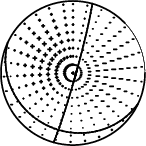
|
|
Figure 1. Waveform inversion focal mechanism
|
The best fit as a function of depth is given in the following figure:
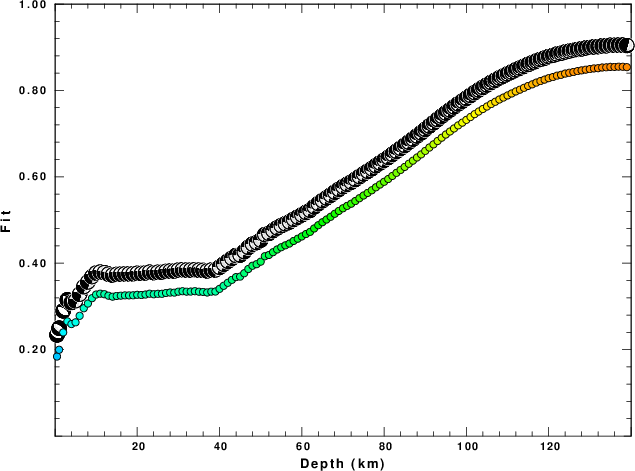
|
|
Figure 2. Depth sensitivity for waveform mechanism
|
The comparison of the observed and predicted waveforms is given in the next figure. The red traces are the observed and the blue are the predicted.
Each observed-predicted component is plotted to the same scale and peak amplitudes are indicated by the numbers to the left of each trace. A pair of numbers is given in black at the right of each predicted traces. The upper number it the time shift required for maximum correlation between the observed and predicted traces. This time shift is required because the synthetics are not computed at exactly the same distance as the observed, the velocity model used in the predictions may not be perfect and the epicentral parameters may be be off.
A positive time shift indicates that the prediction is too fast and should be delayed to match the observed trace (shift to the right in this figure). A negative value indicates that the prediction is too slow. The lower number gives the percentage of variance reduction to characterize the individual goodness of fit (100% indicates a perfect fit).
The bandpass filter used in the processing and for the display was
cut a -30 a 120
rtr
taper w 0.1
hp c 0.02 n 3
lp c 0.05 n 3
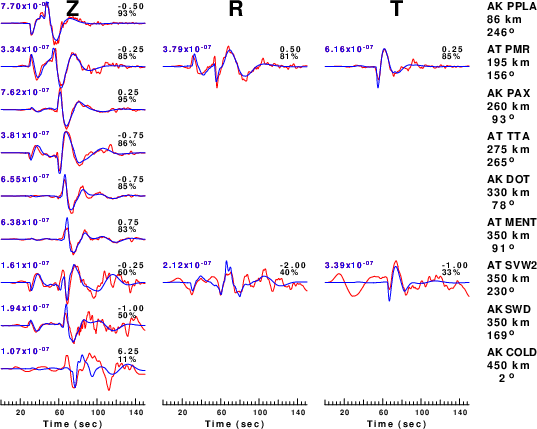
|
|
Figure 3. Waveform comparison for selected depth. Red: observed; Blue - predicted. The time shift with respect to the model prediction is indicated. The percent of fit is also indicated. The time scale is relative to the first trace sample.
|
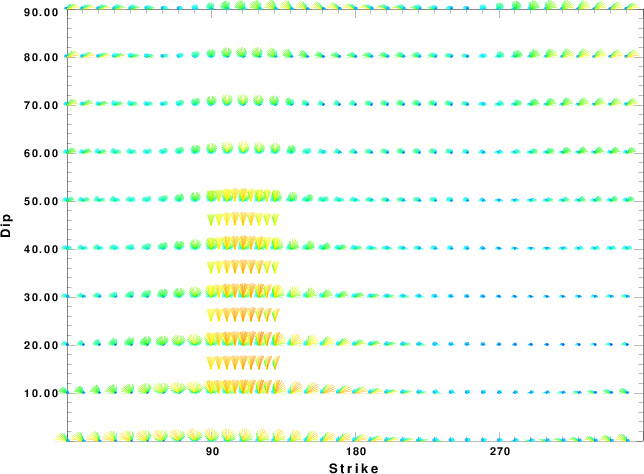
|
|
Focal mechanism sensitivity at the preferred depth. The red color indicates a very good fit to the waveforms.
Each solution is plotted as a vector at a given value of strike and dip with the angle of the vector representing the rake angle, measured, with respect to the upward vertical (N) in the figure.
|
A check on the assumed source location is possible by looking at the time shifts between the observed and predicted traces. The time shifts for waveform matching arise for several reasons:
- The origin time and epicentral distance are incorrect
- The velocity model used for the inversion is incorrect
- The velocity model used to define the P-arrival time is not the
same as the velocity model used for the waveform inversion
(assuming that the initial trace alignment is based on the
P arrival time)
Assuming only a mislocation, the time shifts are fit to a functional form:
Time_shift = A + B cos Azimuth + C Sin Azimuth
The time shifts for this inversion lead to the next figure:
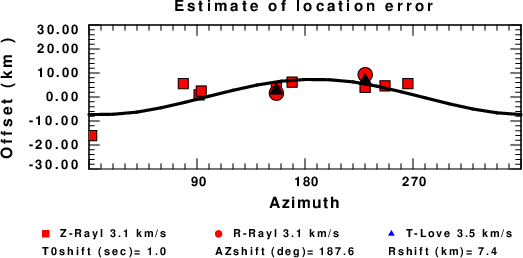
The derived shift in origin time and epicentral coordinates are given at the bottom of the figure.
Velocity Model
The WUS.model used for the waveform synthetic seismograms and for the surface wave eigenfunctions and dispersion is as follows
(The format is in the model96 format of Computer Programs in Seismology).
MODEL.01
Model after 8 iterations
ISOTROPIC
KGS
FLAT EARTH
1-D
CONSTANT VELOCITY
LINE08
LINE09
LINE10
LINE11
H(KM) VP(KM/S) VS(KM/S) RHO(GM/CC) QP QS ETAP ETAS FREFP FREFS
1.9000 3.4065 2.0089 2.2150 0.302E-02 0.679E-02 0.00 0.00 1.00 1.00
6.1000 5.5445 3.2953 2.6089 0.349E-02 0.784E-02 0.00 0.00 1.00 1.00
13.0000 6.2708 3.7396 2.7812 0.212E-02 0.476E-02 0.00 0.00 1.00 1.00
19.0000 6.4075 3.7680 2.8223 0.111E-02 0.249E-02 0.00 0.00 1.00 1.00
0.0000 7.9000 4.6200 3.2760 0.164E-10 0.370E-10 0.00 0.00 1.00 1.00
Last Changed Fri Apr 26 08:01:13 PM CDT 2024





